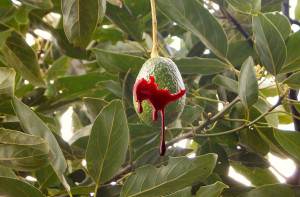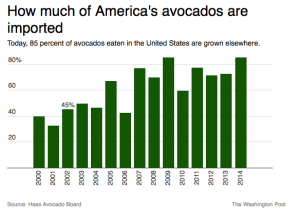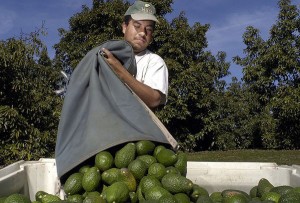 Paying a little extra for avocados is an affordable luxury for most Americans. Many are willing to pay an extra dollar to incorporate avocados in their favorite tacos, soups, salads, wraps, and burrito bowls. Following the avocado’s newfound status as a staple food, increased consumption and difficulty harvesting in the United States has led avocado trade to become a lucrative crop for Mexico. Most Americans currently enjoy the nutty fruit blind to how the avocado’s gang-stricken trade impacts could continue to raise prices.
Paying a little extra for avocados is an affordable luxury for most Americans. Many are willing to pay an extra dollar to incorporate avocados in their favorite tacos, soups, salads, wraps, and burrito bowls. Following the avocado’s newfound status as a staple food, increased consumption and difficulty harvesting in the United States has led avocado trade to become a lucrative crop for Mexico. Most Americans currently enjoy the nutty fruit blind to how the avocado’s gang-stricken trade impacts could continue to raise prices.

Image Source: https://www.washingtonpost.com/news/wonk/wp/2015/01/22/the-sudden-rise-of-the-avocado-americas-new-favorite-fruit/
In the United States, avocados are obtained from three main sources: Mexico, California, and Florida (The Plate). High worker wages, lack of rainfall, and an avocado-tree pathogen have greatly impacted production and profitability of avocado trees in the United States. Thus, the United States has increasingly relied on Mexico to satisfy its avocado needs, importing over 40 percent of its avocados from its neighbor (The Plate).
Avocado imports from Mexico began in 1997, after Congress lifted an eighty year ban on trading the fruit (NPR). The ban was lifted shortly after the introduction of the North American Free Trade Agreement (NAFTA), which ended most tariffs between Canada, Mexico, and the United States. American avocado producers were initially fearful of the risk of oversupply and exposure to pathogens that the influx of Mexican avocados could supply. Since 1997, a large number of American avocado producers have turned to facilitating avocado trade between the United States and Mexico as a profitable source of income. In 2014 alone, Avocados from Mexico, a not-for-profit marketing association, reported that the United States imported over 1,763,593,888 pounds of avocados (Avocados from Mexico).
Today, Mexico is the leading global producer of avocados, producing three times the number of avocados as California and Florida combined. State Michoacan is Mexico’s avocado hub, accounting for 92 percent of the country’s production of the crop. More than 80 percent of Michoan avocados are exported to the United States (Daily Kos). With Mexican grown avocados generating $1 trillion in revenue for the country in 2014 alone, It’s no wonder that in Mexico, avocados have been dubbed the “green gold” (Vanguardia). Avocados produce more profit in Mexico than any other crop, including marijuana, making it a target for Mexican gangs who view it as a source of political and financial influence over areas like Michoacan.
The Caballeros Templarios (Knights Templar) are an example of a Mexican gang targeting the avocado industry. The Knights Templar are primarily known as a drug cartel trafficking cocaine and meth throughout the country. The knights view themselves as protectors of the Michoacan area, using a Robin Hood complex to take money from the rich to help sustain the poor. Now, the gang controls a significant portion of the Mexican avocado industry, from production to distribution (Daily Kos).
According to one Avocado trader, who changed his name to Jesus to maintain privacy from gang members, the cartel is already taking over land and avocado plants. The gang affects farmers, packers, and shopkeepers, taking a huge portion of profits under taxes and fees that they forcibly inflict. Workers are required to report the number of pounds produced per acre of land. The gang receives most of its revenue through administering taxes ranging from ten cents per pound produced to $100 per hectacre of land (Daily Kos). Lying or failing to abide by the gang’s policies often results in violent punishments, including rape, death, and destruction of homes of farmers or their loved ones. Three weeks ago, one notary in Uruapán who refused to sign the deeds to his plantations over to the cartel was severely punished: his son was kidnapped and killed a few days later.
The result of increased crime has led to instability and fears for those in the avocado industry. It has impacted the numbers of those involved in the industry, thereby decreasing supply and raising prices. Though American avocado traders have not revealed the specific financial impact the gangs have had on the prices of avocados, Jesus says that the gang inevitably racks up prices for those in the avocado business trying to stay afloat amidst their high taxes. Ultimately, these price increases make their way all the way up past the Mexican-American border and into grocery shelves across America.
Prices of avocados in the United States have been on the rise for years, but began taking a sharper turn starting in 2013. In 2014, the average price of a Hass avocado was $1.29. In 2015, it went up to $1.38 (Hass Avocado Board). However, avocado demand has remained high as ever. Avocados are continue to fly off the shelf, even if rising prices leaves Americans saying, “holy guacamole!”
Sources:
http://www.vanguardia.com.mx/lostemplariostomancontroldelnegociodelaguacate-1888691.html
http://www.12news.com/news/nation-now/holy-guacamole-avocado-shortage-causing-prices-to-soar/346400878
http://www.producenews.com/the-produce-news-today-s-headlines/19948-avocado-picking-resumes-volume-to-ramp-up-quickly
http://www.theatlantic.com/health/archive/2015/01/the-selling-of-the-avocado/385047/
https://www.washingtonpost.com/news/wonk/wp/2015/01/22/the-sudden-rise-of-the-avocado-americas-new-favorite-fruit/
http://theplate.nationalgeographic.com/2015/05/05/thanks-to-america-weve-reached-peak-avocado/
https://thinkprogress.org/chipotle-warns-it-might-stop-serving-guacamole-if-climate-change-gets-worse-d797f64a932c#.9pird9xu1
http://www.dailykos.com/story/2016/7/12/1546610/-Avocados-and-the-Mexican-Drug-Cartels
http://www.hassavocadoboard.com/retail/volume-and-price-data
http://www.npr.org/sections/thesalt/2015/02/13/385754265/how-nafta-changed-american-and-mexican-food-forever
http://avocadosfrommexico.com/about-afm/

Leave a Reply
You must be logged in to post a comment.